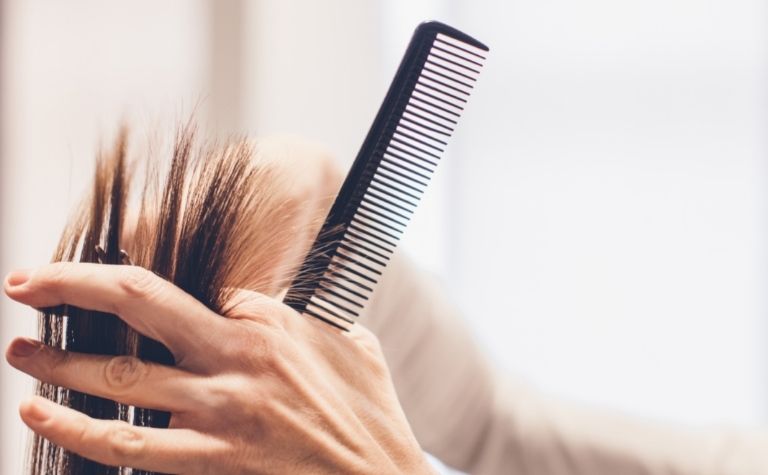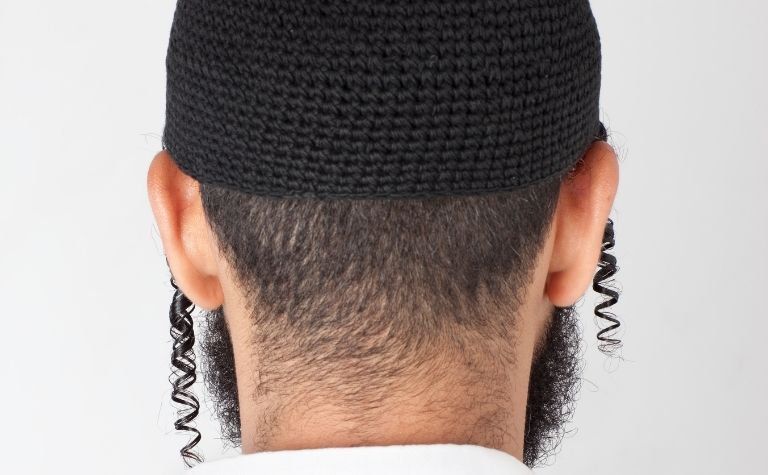The Bible mentions the hair of men and women in multiple places. From Samson’s long hair to Paul’s instruction about short hair, hair — or the lack of it in Elisha’s case — plays a role in several stories in the Bible. The details in these stories cause people to ask questions about hair grooming, which include whether or not cutting your hair is a sin.
Cutting your hair isn’t a sin, which means that it doesn’t violate God’s moral standards. People who cut their hair have no need to repent or confess sin. Some characters in the Bible were known in part for their long hair like Absalom, yet even he got his hair cut once a year to manage its weight (2 Sam. 14:26).
Who does the Bible say cut their hair? Did people have long hair in the Old Testament? Did people have long hair in the New Testament? Why does Paul say that having long hair is a shame for a man? Keep reading to learn the answers to these questions and others.
Also see Does the Bible Say Fear Is A Sin? to learn more.

The Bible’s instructions for wearing and managing hair
Most scholars agree that what the Bible teaches about hairstyles is either unique to individuals (e.g. Samson) or unique to the society in which the instruction was given (e.g. Greece). This doesn’t mean that readers can’t extract principles from these stories, but it does make their instruction culturally relative.
Did people have long hair in the Old Testament? Jewish women generally wore their hair long in the Old Testament era. Some men had long hair, too, like Absalom and Samson. Some readers speculate that people in the Old Testament didn’t have the means to regularly cut hair, but others respond that all it took was a sharp knife or a jagged stone to do the job. Ezekiel also implies that there were barbers in Israel (5:1).
Many scholars believe that having long hair was a cultural convention for men and women before the time of Jesus Christ. “The normal Israelite custom, for both sexes, seems to have been to let the hair grow to considerable length.” [1] Some readers wonder how this fact aligns with verses that teach that men shouldn’t take on the appearance of a woman.
Deuteronomy 22:5 instructs men not to wear women’s clothing: “A woman shall not wear a man’s garment, nor shall a man put on a woman’s cloak, for whoever does these things is an abomination to the Lord your God” (ESV). The verse doesn’t mention that the length of a man’s hair was offensive to God. The assumption that it was may be rooted in modern generational norms.
Why did people have long hair in the Old Testament? There are likely multiple answers to this question. Some scholars argue that having lots of hair set the Israelites apart from the Egyptians. In ancient Egypt, the cultural norm was to shave the head and the face. The long hair that many Jews wore and the beards the men grew differentiated them from the people that once held them captive for 400 years.
Egyptian grooming customs are evident in the story of Joseph. Genesis 41:14 reads, “Then Pharaoh sent and called Joseph, and they quickly brought him out of the pit. And when he had shaved himself and changed his clothes, he came in before Pharaoh” (ESV). There is no indication in the text that Joseph sinned by shaving himself. In fact, God showed great favor in Egypt.
Also see Are Subliminals A Sin? to learn more.

Why couldn’t the Jews cut their forelocks? Leviticus 19:27 reads, “You shall not round off the hair on your temples or mar the edges of your beard” (ESV). Scholars know that pagan cults shaved their forelocks as a sign of faithfulness to their belief system. God’s instruction to his people signified the exact opposite of the appearance of unbelievers to disassociate them from false belief systems.
Additionally, long hair was a sign of heath in ancient Israel. In contrast, baldness was associated with diseases like leprosy. A man could lose his hair and still be ceremonially clean, and diseases were sometimes associated with hair and beards (e.g. Lev. 13:40-44). Nevertheless, lots of healthy hair was generally a sign of youth and physical wellness.
Why does Paul say that having long hair is a shame for a man?
In 1 Corinthians, Paul writes, “Does not nature itself teach you that if a man wears long hair it is a disgrace for him, but if a woman has long hair, it is her glory?” (v. 14-15a). Does the fact that Paul’s argument is based on “nature” refute the idea that this instruction is culturally relative? Didn’t Paul grow out his hair when he took a Nazirite vow?
What does Paul mean when he says “nature”? Some scholars find it significant that Paul’s argument isn’t based on a passage of Scripture or on a theological principle. Instead, he appeals to “nature,” which is likely an appeal to the ancient Greek worldview that championed “nature” in their philosophy. In other words, he is referring to what is culturally normal.
The best 1 Corinthians commentary, based on aggregate academic reviews, explains the implications of this teaching for modern readers. Author Gordon Fee writes:
“Paul is not arguing that men must wear their hair short, or that women must have long hair, as though ‘nature’ meant some kind of ‘created order.’ Indeed, the very appeal to ‘nature’ in this way suggests most strongly that the argument is by way of analogy, not of necessity… After all, according to Acts 18:18 Paul had apparently worn long hair for a time in Corinth as part of a vow.” [2, emphasis added]
Why does Luke mention Paul’s hair in Acts 18:18? Luke mentions that Paul had his hair groomed before sailing to Syria during his second missionary journey. “After this, Paul stayed many days longer and then took leave of the brothers and set sail for Syria, and with him Priscilla and Aquila. At Cenchreae he had cut his hair, for he was under a vow” (ESV, emphasis added).
| Translation | Acts 18:18 |
|---|---|
| NIV | “Paul stayed on in Corinth for some time. Then he left the brothers and sisters and sailed for Syria, accompanied by Priscilla and Aquila. Before he sailed, he had his hair cut off at Cenchreae because of a vow he had taken.” |
| NLT | “Paul stayed in Corinth for some time after that, then said good-bye to the brothers and sisters and went to nearby Cenchrea. There he shaved his head according to Jewish custom, marking the end of a vow. Then he set sail for Syria, taking Priscilla and Aquila with him.” |
| KJV | “And Paul after this tarried there yet a good while, and then took his leave of the brethren, and sailed thence into Syria, and with him Priscilla and Aquila; having shorn his head in Cenchrea: for he had a vow.” |
| NKJV | “So Paul still remained a good while. Then he took leave of the brethren and sailed for Syria, and Priscilla and Aquila were with him. He had his hair cut off at Cenchrea, for he had taken a vow.” |
| NASB | “Paul, having remained many days longer, took leave of the brethren and put out to sea for Syria, and with him were Priscilla and Aquila. In Cenchrea he had his hair cut, for he was keeping a vow.” |
Also see Is Laziness A Sin in the Bible? to learn more.
Why did Paul get a haircut? Though Luke doesn’t provide much information about Paul’s haircut, most scholars believe he had taken a Nazirite vow (cf. Num. 6:1-21). As Numbers explains, the Nazirite vow included not consuming certain foods and drinks for a period of time as well as not cutting one’s hair.
“All the days of his vow of separation, no razor shall touch his head. Until the time is completed for which he separates himself to the LORD, he shall be holy. He shall let the locks of hair of his head grow long” (Num. 6:5). Why did Paul take this vow? Luke doesn’t say. Scholars speculate that it was that Paul petitioned God for safety in travel, evangelistic success, or perhaps both. [3]
Was it a sin for Paul to cut his hair? No. The Nazirite vow anticipated it. Paul’s long hair wasn’t a sin, and neither was cutting it.

Also see Is Eating Meat A Sin? to learn more.
9 Bible verses about cutting your hair
- Leviticus 19:27, “You shall not round off the hair on your temples or mar the edges of your beard.”
- 1 Corinthians 11:14, “Does not nature itself teach you that if a man wears long hair it is a disgrace for him”
- Judges 16:19, “She made him sleep on her knees. And she called a man and had him shave off the seven locks of his head. Then she began to torment him, and his strength left him.”
- 1 Peter 3:3, “Do not let your adorning be external—the braiding of hair and the putting on of gold jewelry, or the clothing you wear—”
- Ezekiel 44:20, “They shall not shave their heads or let their locks grow long; they shall surely trim the hair of their heads.”
- Leviticus 21:5, “They shall not make bald patches on their heads, nor shave off the edges of their beards, nor make any cuts on their body.”
- 1 Timothy 2:9, “Likewise also that women should adorn themselves in respectable apparel, with modesty and self-control, not with braided hair and gold or pearls or costly attire”
- 2 Samuel 14:26, “And when he cut the hair of his head (for at the end of every year he used to cut it; when it was heavy on him, he cut it), he weighed the hair of his head, two hundred shekels by the king’s weight.”
- 2 Samuel 10:4, “So Hanun took David’s servants and shaved off half the beard of each and cut off their garments in the middle, at their hips, and sent them away.”
Also see Is Cheating On A Test A Sin? to learn more.
References:
[1] New Bible Dictionary, p. 440.
[2] 1 Corinthians by Gordon Fee. NICNT. p. 527
[3] Acts by Eckhard J. Schnabel. ZECNT. p. 767.
Related Articles
Contrary to popular belief, the Bible isn't prudish when it comes to sexual intimacy and its various expressions. In fact, some passages describe what many would consider graphic depictions of...
Sloth has always been an especially notorious sin in the Christian church because it's a behavior (or lack thereof) that is highlighted in the Bible as ungodly. Sloth is even one of the Seven Deadly...
